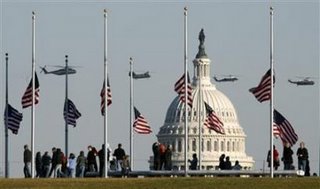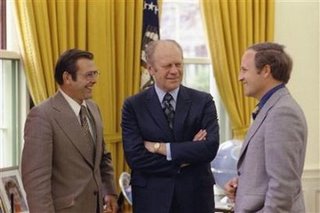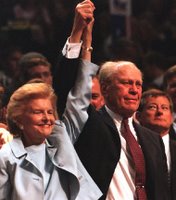My fellow Americans, our long national nightmare is over. Our Constitution works!
These are the memorable words President Gerald R. Ford uttered to signal the end of Richard Nixon’s scandalous presidency and the beginning of his ill-fated two and a half years as the 38th president of the United States.

Ford passed away on Tuesday at the enviable age of 93. And even though retrospectives on his life and presidency will saturate TV 24/7 until he’s buried (pursuant to an elaborate state funeral which, according to custom, he planned himself), I feel obliged to pay my respects – even at the risk of being redundant.
It’s no exaggeration to say that Gerald Ford was an accidental president. After all, he is the only man in U.S. history to have served as vice president and president without campaigning for either position. Because when financial scandal forced Spiro Agnew to resign as Nixon’s VP in October 1973, Nixon selected Ford as his replacement. And, when Watergate forced Nixon to resign 10 months later, Ford became president.
 But what I find most extraordinary about Ford’s presidency is that he led America out of not one, but two long nightmares: Watergate and Vietnam. And it’s truly ironic that two of the men he hired to help guide him out of these political disasters (Donald Rumsfeld (left) as Secretary of Defense and Dick Cheney (right) as Chief of Staff) are the very two men most responsible for getting America back into another nightmare: Iraq….
But what I find most extraordinary about Ford’s presidency is that he led America out of not one, but two long nightmares: Watergate and Vietnam. And it’s truly ironic that two of the men he hired to help guide him out of these political disasters (Donald Rumsfeld (left) as Secretary of Defense and Dick Cheney (right) as Chief of Staff) are the very two men most responsible for getting America back into another nightmare: Iraq….
The ultimate (political) irony, however, is that Ford ruined his chances of being elected president in 1976 in his own right when he pardoned Nixon for his Watergate crimes within weeks of becoming president. Yet even his critics have come to appreciate that pardoning Nixon was a wholly selfless and enlightened act. Indeed, so much so that his fiercest critic, Senator Ted Kennedy (D-MA), saw to it that Ford received the John F. Kennedy Profiles in Courage Award in 2001 for making the “controversial decision of conscience to pardon former President Richard M. Nixon”.
For the record, here’s how Ford explained this historic pardon:
I simply was not convinced that the country wanted to see an ex-president behind bars. We are not a vengeful people; forgiveness is one of the roots of the American tradition. And Nixon, in my opinion, had already suffered enormously. His resignation was an implicit admission of guilt, and he would have to carry forever the burden of his disgrace. But I wasn’t motivated primarily by sympathy for his plight or by concern over the state of his health. It was the state of the country’s health at home and around the world that worried me.
 Nonetheless, the ultimate irony is that this accidental president will probably be remembered as much for being Betty Ford’s husband as for anything he did as president. Because after he left the White House, Ford lived the remainder of his 30 years in relative obscurity, if not ignominy (notwithstanding all of the posthumous accolades being expressed).
Nonetheless, the ultimate irony is that this accidental president will probably be remembered as much for being Betty Ford’s husband as for anything he did as president. Because after he left the White House, Ford lived the remainder of his 30 years in relative obscurity, if not ignominy (notwithstanding all of the posthumous accolades being expressed).
Indeed, despite his humble and altruistic reputation, Ford was criticized for spending most of his time either in corporate boardrooms or golf courses; instead of engaging in the public-spirited activities that have made Jimmy Carter, George H.W. Bush, and Bill Clinton such popular ex-presidents. And, his reputation was hardly enhanced by Chevy Chase establishing his career by lampooning Ford as bumbling buffoon in sophomoric skits on Saturday Night Live….
Meanwhile, he basked in the reflected glow of his liberated wife who became famous in her own right after her public struggles with addictions led her to found the Betty Ford Center for the treatment of alcohol and drug dependency.
Related Article:
Washington Post: Retrospective and funeral plans
Deaths of famous people come in threes…?
President Gerald Ford
Leave a Reply
You must be logged in to post a comment.